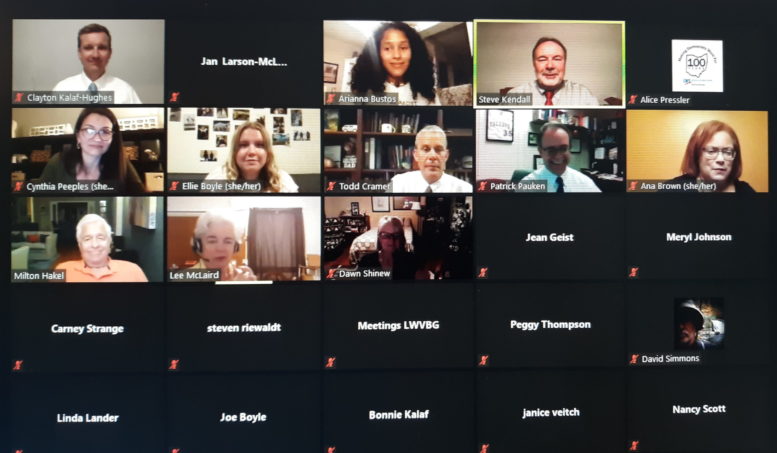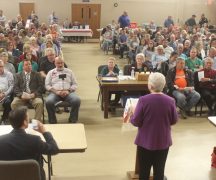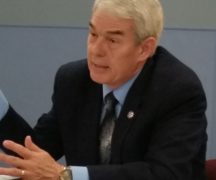By JAN LARSON McLAUGHLIN
BG Independent News
Free speech and access to ideas in classrooms would be crippled by the two bills being considered by the Ohio House, according to local educators and students.
More than 150 people listened in during the virtual “Honesty in Education” forum hosted Wednesday evening by the Bowling Green League of Women Voters.
Twenty-seven states are discussing or have already passed legislation that would limit classes’ abilities to address topics like racism, slavery, sexism and other “uncomfortable” topics. Ohio will pick up discussion on the two bills when the House returns next week.
House Bill 327 would prohibit teaching, advocating, or promoting “divisive concepts” in school districts, state colleges and political subdivisions. The bill threatens to cut funding for school districts that violate the prohibitions listed.
The bill allows coverage of controversial content – but educators must be neutral in handling the topics. That has left teachers wondering how to talk about subjects like segregation, lynchings or the Holocaust.
H.B. 327 includes penalties of state funding cuts up to 100%, and the revocation of licenses.
House Bill 322 would prohibit teaching certain current events and certain concepts regarding race and sex in public schools. The bill permits parents to file civil suits against school districts and teachers.
Pat Pauken, an attorney and educational law professor at BGSU, said the legislation would result in a freeze on access to ideas, learning and growth in classrooms – doing a disservice to students.
“These bills would chill free speech of our teachers and students,” Pauken said.
Panelists talked about the proposed bills being a reaction to worries about Critical Race Theory being taught in schools. CRT is not taught in K-12 classrooms, Pauken said.
The theory acknowledges the stark racial disparities that have persisted in the U.S. despite decades of civil rights reforms. It raises questions about how racist hierarchies are enforced, even among people with good intentions.
Maumee Superintendent Todd Cramer said when parents come to him with concerns, he poses one question.
“Tell me what you mean by Critical Race Theory,” Cramer said. “It’s usually not founded in anything grounded in truth.”
Clayton Kalaf-Hughes, AP teacher at Bowling Green High School, talked about the mechanisms already in place to make sure he stays on track to meet standards in his classroom.
To prepare students for the world, they need to be exposed to difficult topics.
“That’s part of the educational process,” Kalaf-Hughes said. “You need to create a space that is safe. That is vital.”
BGSU student Ellie Boyle talked about the fear that learning about the United States’ flaws will make students anti-American. That simply isn’t true, she said.
“Students deserve to know history,” Boyle said. “You can’t love something if you don’t know what it is.”
Boyle and Ariana Bustos, another BGSU student, talked about the value of learning from multiple perspectives on controversial topics.
Parents have no problem with high school students learning different perspectives on the Federalist Papers, Boyle said. But when it comes to topics like racism or sexism, some want discussion to be limited.
When studying slavery, it’s important that students hear the voices of those enslaved – “not just how the government had to make rules to correct their mistakes,” Boyle said.
Ana Brown, deputy chief for Diversity, Belonging, Multicultural Affairs at BGSU, agreed.
“If we’re teaching only part of the story, we’re doing our students a disservice,” Brown said.
That is not patriotism – but nationalism. “That’s a dangerous path,” Brown said.
The panel talked about which topics would qualify as uncomfortable or controversial. Pauken said the proposed laws, as written, are unconstitutionally vague.
Moderator Steve Kendall asked if H.B. 327 could be discussed in a classroom under the proposed rules. It was suggested that since it is a “widely debated topic,” it would not be allowed.
The proposed legislation was also spurred by concerns that white children in classrooms are being made to feel guilt or discomfort about racism in America. Critical Race Theory – while it addresses the role of race – is not aimed at making white people feel shame.
But it may increase awareness, Brown said. “Growth happens in moments of discomfort,” she added.
Brown talked about growing up as a Black child in rural Northwest Ohio.
“I was made to feel uncomfortable in the classroom a lot,” she said, noting that her race was left out of the curriculum.
Bustos said the legislation could make it difficult to discuss race issues. Any efforts to address her culture as Latino and Black would likely be a “watered-down version.”
Younger classes also benefit from diversity and inclusion, according to Brown
“Children see differences,” such as race, gender, age and abilities, she said. “They don’t attach a value to them until adults show them.”
Cramer said the proposed legislation would be a change for public schools – which encourage discussion of controversial topics.
“This would be a significant shift,” he said.
If a student approached a teacher about a difficult topic, the teacher may have to shut down the conversation. That would result in a loss of teachable moments, Cramer said.
Cramer said if parents have concerns, they should bring them directly to the school district.
“Let’s show our youth how we go about healthy discord,” he said.
Janet Parks, president of the Bowling Green League of Women Voters, talked about the purpose of the forum and the organization’s belief in the value of education.
“Education is the bedrock of our democracy,” she said. And a true education “invites open dialogue and debate.”
Honesty in education isn’t afraid to address the nation’s history of racism, sexism and other uncomfortable issues, Parks said.
The public can review the two proposed bills at: https://www.legislature.ohio.gov/legislation/legislation-summary?id=GA134-HB-322http and https://www.legislature.ohio.gov/legislation/legislation-summary?id=GA134-HB-327
The forum may be viewed at the LWVBG YOUTUBE Channel.




